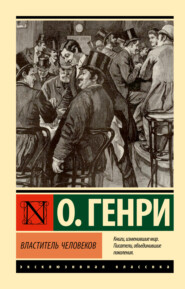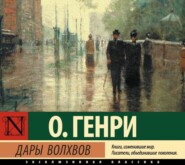По всем вопросам обращайтесь на: info@litportal.ru
(©) 2003-2025.
✖
Options
Настройки чтения
Размер шрифта
Высота строк
Поля
Tripp pulled the bell at the door of the mouldy red-brick boarding-house. At its faint tinkle he paled, and crouched as a rabbit makes ready to spring away at the sound of a hunting-dog. I guessed what a life he had led, terror-haunted by the coming footsteps of landladies.
"Give me one of the dollars – quick!" he said.
The door opened six inches. Mother McGinnis stood there with white eyes – they were white, I say – and a yellow face, holding together at her throat with one hand a dingy pink flannel dressing-sack. Tripp thrust the dollar through the space without a word, and it bought us entry.
"She's in the parlor," said the McGinnis, turning the back of her sack upon us.
In the dim parlor a girl sat at the cracked marble centre-table weeping comfortably and eating gum-drops. She was a flawless beauty. Crying had only made her brilliant eyes brighter. When she crunched a gum-drop you thought only of the poetry of motion and envied the senseless confection. Eve at the age of five minutes must have been a ringer for Miss Ada Lowery at nineteen or twenty. I was introduced, and a gum-drop suffered neglect while she conveyed to me a naÏve interest, such as a puppy dog (a prize winner) might bestow upon a crawling beetle or a frog.
Tripp took his stand by the table, with the fingers of one hand spread upon it, as an attorney or a master of ceremonies might have stood. But he looked the master of nothing. His faded coat was buttoned high, as if it sought to be charitable to deficiencies of tie and linen.
I thought of a Scotch terrier at the sight of his shifty eyes in the glade between his tangled hair and beard. For one ignoble moment I felt ashamed of having been introduced as his friend in the presence of so much beauty in distress. But evidently Tripp meant to conduct the ceremonies, whatever they might be. I thought I detected in his actions and pose an intention of foisting the situation upon me as material for a newspaper story, in a lingering hope of extracting from me his whiskey dollar.
"My friend" (I shuddered), "Mr. Chalmers," said Tripp, "will tell you, Miss Lowery, the same that I did. He's a reporter, and he can hand out the talk better than I can. That's why I brought him with me." (O Tripp, wasn't it the silver-tongued orator you wanted?) "He's wise to a lot of things, and he'll tell you now what's best to do."
I stood on one foot, as it were, as I sat in my rickety chair.
"Why – er – Miss Lowery," I began, secretly enraged at Tripp's awkward opening, "I am at your service, of course, but – er – as I haven't been apprized of the circumstances of the case, I – er – "
"Oh," said Miss Lowery, beaming for a moment, "it ain't as bad as that – there ain't any circumstances. It's the first time I've ever been in New York except once when I was five years old, and I had no idea it was such a big town. And I met Mr. – Mr. Snip on the street and asked him about a friend of mine, and he brought me here and asked me to wait."
"I advise you, Miss Lowery," said Tripp, "to tell Mr. Chalmers all. He's a friend of mine" (I was getting used to it by this time), "and he'll give you the right tip."
"Why, certainly," said Miss Ada, chewing a gum-drop toward me. "There ain't anything to tell except that – well, everything's fixed for me to marry Hiram Dodd next Thursday evening. Hi has got two hundred acres of land with a lot of shore-front, and one of the best truck-farms on the Island. But this morning I had my horse saddled up – he's a white horse named Dancer – and I rode over to the station. I told 'em at home I was going to spend the day with Susie Adams. It was a story, I guess, but I don't care. And I came to New York on the train, and I met Mr. – Mr. Flip on the street and asked him if he knew where I could find G – G – "
"Now, Miss Lowery," broke in Tripp, loudly, and with much bad taste, I thought, as she hesitated with her word, "you like this young man, Hiram Dodd, don't you? He's all right, and good to you, ain't he?"
"Of course I like him," said Miss Lowery emphatically. "Hi's all right. And of course he's good to me. So is everybody."
I could have sworn it myself. Throughout Miss Ada Lowery's life all men would be to good to her. They would strive, contrive, struggle, and compete to hold umbrellas over her hat, check her trunk, pick up her handkerchief, and buy for her soda at the fountain.
"But," went on Miss Lowery, "last night I got to thinking about G – George, and I – "
Down went the bright gold head upon dimpled, clasped hands on the table. Such a beautiful April storm! Unrestrainedly she sobbed. I wished I could have comforted her. But I was not George. And I was glad I was not Hiram – and yet I was sorry, too.
By-and-by the shower passed. She straightened up, brave and half-way smiling. She would have made a splendid wife, for crying only made her eyes more bright and tender. She took a gum-drop and began her story.
"I guess I'm a terrible hayseed," she said between her little gulps and sighs, "but I can't help it. G – George Brown and I were sweethearts since he was eight and I was five. When he was nineteen – that was four years ago – he left Greenburg and went to the city. He said he was going to be a policeman or a railroad president or something. And then he was coming back for me. But I never heard from him any more. And I – I – liked him."
Another flow of tears seemed imminent, but Tripp hurled himself into the crevasse and dammed it. Confound him, I could see his game. He was trying to make a story of it for his sordid ends and profit.
"Go on, Mr. Chalmers," said he, "and tell the lady what's the proper caper. That's what I told her – you'd hand it to her straight. Spiel up."
I coughed, and tried to feel less wrathful toward Tripp. I saw my duty. Cunningly I had been inveigled, but I was securely trapped. Tripp's first dictum to me had been just and correct. The young lady must be sent back to Greenburg that day. She must be argued with, convinced, assured, instructed, ticketed, and returned without delay. I hated Hiram and despised George; but duty must be done. Noblesse oblige and only five silver dollars are not strictly romantic compatibles, but sometimes they can be made to jibe. It was mine to be Sir Oracle, and then pay the freight. So I assumed an air that mingled Solomon's with that of the general passenger agent of the Long Island Railroad.
"Miss Lowery," said I, as impressively as I could, "life is rather a queer proposition, after all." There was a familiar sound to these words after I had spoken them, and I hoped Miss Lowery had never heard Mr. Cohan's song. "Those whom we first love we seldom wed. Our earlier romances, tinged with the magic radiance of youth, often fail to materialize." The last three words sounded somewhat trite when they struck the air. "But those fondly cherished dreams," I went on, "may cast a pleasant afterglow on our future lives, however impracticable and vague they may have been. But life is full of realities as well as visions and dreams. One cannot live on memories. May I ask, Miss Lowery, if you think you could pass a happy – that is, a contented and harmonious life with Mr. – er – Dodd – if in other ways than romantic recollections he seems to – er – fill the bill, as I might say?"
"Oh, Hi's all right," answered Miss Lowery. "Yes, I could get along with him fine. He's promised me an automobile and a motor-boat. But somehow, when it got so close to the time I was to marry him, I couldn't help wishing – well, just thinking about George. Something must have happened to him or he'd have written. On the day he left, he and me got a hammer and a chisel and cut a dime into two pieces. I took one piece and he took the other, and we promised to be true to each other and always keep the pieces till we saw each other again. I've got mine at home now in a ring-box in the top drawer of my dresser. I guess I was silly to come up here looking for him. I never realized what a big place it is."
And then Tripp joined in with a little grating laugh that he had, still trying to drag in a little story or drama to earn the miserable dollar that he craved.
"Oh, the boys from the country forget a lot when they come to the city and learn something. I guess George, maybe, is on the bum, or got roped in by some other girl, or maybe gone to the dogs on account of whiskey or the races. You listen to Mr. Chalmers and go back home, and you'll be all right."
But now the time was come for action, for the hands of the clock were moving close to noon. Frowning upon Tripp, I argued gently and philosophically with Miss Lowery, delicately convincing her of the importance of returning home at once. And I impressed upon her the truth that it would not be absolutely necessary to her future happiness that she mention to Hi the wonders or the fact of her visit to the city that had swallowed up the unlucky George.
She said she had left her horse (unfortunate Rosinante) tied to a tree near the railroad station. Tripp and I gave her instructions to mount the patient steed as soon as she arrived and ride home as fast as possible. There she was to recount the exciting adventure of a day spent with Susie Adams. She could "fix" Susie – I was sure of that – and all would be well.
And then, being susceptible to the barbed arrows of beauty, I warmed to the adventure. The three of us hurried to the ferry, and there I found the price of a ticket to Greenburg to be but a dollar and eighty cents. I bought one, and a red, red rose with the twenty cents for Miss Lowery. We saw her aboard her ferryboat, and stood watching her wave her handkerchief at us until it was the tiniest white patch imaginable. And then Tripp and I faced each other, brought back to earth, left dry and desolate in the shade of the sombre verities of life.
The spell wrought by beauty and romance was dwindling. I looked at Tripp and almost sneered. He looked more careworn, contemptible, and disreputable than ever. I fingered the two silver dollars remaining in my pocket and looked at him with the half-closed eyelids of contempt. He mustered up an imitation of resistance.
"Can't you get a story out of it?" he asked, huskily. "Some sort of a story, even if you have to fake part of it?"
"Not a line," said I. "I can fancy the look on Grimes' face if I should try to put over any slush like this. But we've helped the little lady out, and that'll have to be our only reward."
"I'm sorry," said Tripp, almost inaudibly. "I'm sorry you're out your money. Now, it seemed to me like a find of a big story, you know – that is, a sort of thing that would write up pretty well."
"Let's try to forget it," said I, with a praiseworthy attempt at gayety, "and take the next car 'cross town."
I steeled myself against his unexpressed but palpable desire. He should not coax, cajole, or wring from me the dollar he craved. I had had enough of that wild-goose chase.
Tripp feebly unbuttoned his coat of the faded pattern and glossy seams to reach for something that had once been a handkerchief deep down in some obscure and cavernous pocket. As he did so I caught the shine of a cheap silver-plated watch-chain across his vest, and something dangling from it caused me to stretch forth my hand and seize it curiously. It was the half of a silver dime that had been cut in halves with a chisel.
"What!" I said, looking at him keenly.
"Oh yes," he responded, dully. "George Brown, alias Tripp. What's the use?"
Barring the W. C. T. U., I'd like to know if anybody disapproves of my having produced promptly from my pocket Tripp's whiskey dollar and unhesitatingly laying it in his hand.
THE HIGHER PRAGMATISM
I
Where to go for wisdom has become a question of serious import. The ancients are discredited; Plato is boiler-plate; Aristotle is tottering; Marcus Aurelius is reeling; Æsop has been copyrighted by Indiana; Solomon is too solemn; you couldn't get anything out of Epictetus with a pick.
The ant, which for many years served as a model of intelligence and industry in the school-readers, has been proven to be a doddering idiot and a waster of time and effort. The owl to-day is hooted at. Chautauqua conventions have abandoned culture and adopted diabolo. Graybeards give glowing testimonials to the venders of patent hair-restorers. There are typographical errors in the almanacs published by the daily newspapers. College professors have become —
But there shall be no personalities.
To sit in classes, to delve into the encyclopedia or the past-performances page, will not make us wise. As the poet says, "Knowledge comes, but wisdom lingers." Wisdom is dew, which, while we know it not, soaks into us, refreshes us, and makes us grow. Knowledge is a strong stream of water turned on us through a hose. It disturbs our roots.
Then, let us rather gather wisdom. But how to do so requires knowledge. If we know a thing, we know it; but very often we are not wise to it that we are wise, and —
But let's go on with the story.
II
Once upon a time I found a ten-cent magazine lying on a bench in a little city park. Anyhow, that was the amount he asked me for when I sat on the bench next to him. He was a musty, dingy, and tattered magazine, with some queer stories bound in him, I was sure. He turned out to be a scrap-book.

















